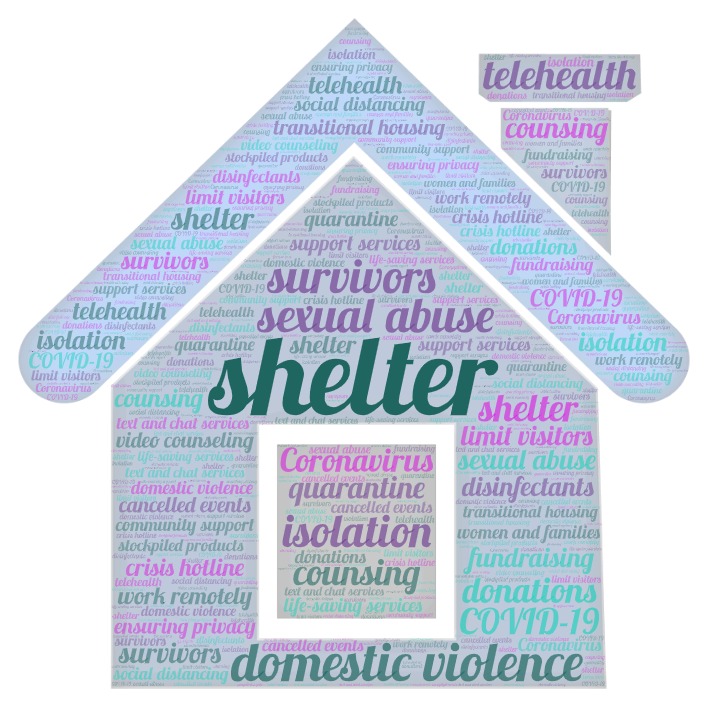
As Michiganders cope with the coronavirus pandemic by social distancing, domestic violence shelters continue to serve survivors of relationship violence and sexual assault.
While Gov. Gretchen Whitmer urges those who can work remotely to do so, this option is not available to those who work in shelters.
Aimee Nimeh is president and CEO of HAVEN, a women’s shelter in Pontiac. Situated in Oakland County, which as of March 26. has 553 confirmed cases of COVID-19, HAVEN provides survivors of abuse with transitional housing and counseling.
Nimeh said workers at HAVEN have had to grapple with the pandemic as individuals and as staff members.
“As just a person, a community member, me and everyone else here is trying to keep our families safe, and as professionals trying to maintain services for survivors, we’ve been trying to process what it means for us,” Nimeh said. “We have added pressure of wanting to make sure services stay open and are uninterrupted and keep staff and survivors safe.”
Distancing a challenge in shelter and transitional housing
Like other domestic violence shelters, HAVEN has increased protocols to promote good hygiene in the facility, including more frequent use of disinfectants. Additionally, Nimeh said, they’re doing their best to engage in social distancing.
“We’re trying to limit visitors into the building,” Nimeh said. “We have a shelter and families that are in our shelter right now. We’ve gotten as many supplies as we are able to to have on hand, and we’re looking at telehealth services for survivors who aren’t living here to receive counseling services.”
Barbara Niess-May is executive director of SafeHouse Center in Ann Arbor. She said that trying to follow state guidelines to allow people to work from home, as direct-care providers are not equipped to provide remote services.
“The reality is we can’t,” Niess-May said. “We are face-to-face, especially for shelter residents. The phones for the hotlines have to be answered in the building.”
She said much of the concerns regarding switching to telehealth options for those who receive counseling through SafeHouse Center are focused on preserving the privacy of survivors. Currently, she said, it might not be safe for survivors to seek services from their homes, and staff do not have a work-from-home technology to provide telemedicine.
“We keep thinking about privacy and keeping our staff safe creatively,” Niess-May said. “I keep asking myself, ‘Am I doing the right thing?’”
Time will tell if isolation will hurt survivors
One issue keeps Niess-May wondering about how to proceed. She is worried that social distancing has become “government-sanctioned isolation” that abusers might use to expand the control they exert over survivors’ connections to family, friends and support services.
So far, Nimeh said, HAVEN has not seen a dip or spike in crisis calls and first-response for the organization’s sexual assault and strangulation advocacy and examination services. However, she said she shares Niess-May’s concerns regarding the unintended consequences of social distancing.
“Social isolation and other kinds of isolation are part of the power and control tactics that batterers often use, so we anticipate that it might be used more effectively to keep survivors from reaching out to get help,” Nimeh said. “So we’re doing the best we can to make sure survivors know that we’ve got texting options and calling options, and that they can still walk in, that we’re still open.”
MSU Safe Place is an on-campus domestic violence shelter that serves as a resource for the MSU and East Lansing community. Advocacy coordinator Erica Schmittdiel said that concern for survivors should be consistent, not just in times of crisis.
“I see the potential for an increase in domestic violence instances, but I also know domestic violence happens 365 days a year,” she said.
Unlike HAVEN and SafeHouse Center, MSU Safe Place is small. Currently, Schmittdiel said, the shelter has only five residents. Each has their own living unit and they do not share a kitchen. Because of this smaller size, the staff of MSU Safe Place has been able to continue services with telehealth options in a relatively quick transition.
Funding needs to come from somewhere
“Even though MSU has told employees to work from home if at all possible, we’re not abandoning them,” Schmittdiel said. “We’re still going to make sure they get supplies, food and emotional support. We have asked them to contact us over the phone or text.”
Providing supplies and food is not as easy for larger shelters, Nimeh said. She said HAVEN has been hurt by those who stockpiled toilet paper and created shortages at grocery stores.
“It has presented challenges to us in being able to access products … For example, if you can only buy two cases of toilet paper at a time, a shelter needs more than that, so we’ve had to send staff out to different stores,” Nimeh said. “Thankfully, we have been able to secure some things, and we’re asking the community to help us keep the flow coming in.”
While donations of services are appreciated, Nimeh said monetary donations are going to take a hit for HAVEN and other shelters because fundraising events have been canceled.
“I think both the state and federal government could really help us by looking at ways to financially support us through these times,” Nimeh said. “We have to stay open. It’s our mission to provide these services, but we can’t do fundraisers we’ve done in the past, and we’re seeing donations go down … We need help to maintain services for these next few months.”
She said that these services, which Niess-May described as “life-saving” must continue during this period.
“I really would just hope that folks understand that while everyone knows places like hospitals and police have to stay open, that small shelters like us have to, as well,” Nimeh said. “We’re still here, we’re all in this together, and we need help, too.”